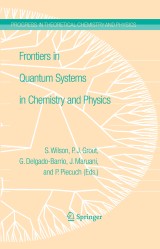Details

Frontiers in Quantum Systems in Chemistry and Physics
Progress in Theoretical Chemistry and Physics, Band 18
|
213,99 € |
|
| Verlag: | Springer |
| Format: | |
| Veröffentl.: | 12.09.2008 |
| ISBN/EAN: | 9781402087073 |
| Sprache: | englisch |
| Anzahl Seiten: | 587 |
Dieses eBook enthält ein Wasserzeichen.
Beschreibungen
In this volume we have collected some of the contributions made to the Twelfth European Workshop on Quantum Systems in Chemistry and Physics (QSCP-XII) in 2007. The workshop was held at Royal Holloway College, the most westerly campusof the University of London,and situated just a stone’s throw from Windsor Great Park. The workshop, which ran from 30 August to 5 September, continued the series that was established by Roy McWeeny in April 1996 with a meeting held at San Miniato, near Pisa. The purpose of the QSCP workshops is to bring together, in an informal atmosphere and with the aim of fostering collaboration, those chemists and physicists who share a common ?eld of interest in the theory of the quantum many-body problem. Quantum mechanics provides a theoretical foundation for our understandingof the structure,propertiesanddynamicsof atoms, moleculesandthe solid state, in terms of their component particles: electrons and nuclei. The study of ‘Quantum Systems in Chemistry and Physics’ therefore underpins many of the emerging?elds in twenty-?rstcenturyscience andtechnology:nanostructure,smart materials, drug design – to name but a few. Members of the workshop were keen to discuss their research and engage in collaboration centred upon the development of fundamental and innovative theory which would lead to the exploration of new concepts. The proceedings of all of the workshops, which have been held annually since 1996, have been published both to disseminate the latest developments within the wider community and to stimulate further collaboration.
Workshop.- to the Workshop.- Quantum Systems in Chemistry and Physics XIIth Workshop Report.- Proceedings.- Study of the Electronic Structure of the Unconventional Superconductor Sr2RuO4 by the Embedded Cluster Method.- An Introduction to the Density Matrix Renormalization Group Ansatz in Quantum Chemistry.- Method of Moments of Coupled Cluster Equations Employing Multi-Reference Perturbation Theory Wavefunctions: General Formalism, Diagrammatic Formulation, Implementation, and Benchmark Studies.- Guidelines on the Contracted Schrödinger Equation Methodology.- Molecular Energy Decompositions in the Hilbert-Space of Atomic Orbitals at Correlated Level.- Dirac-Coulomb Equation: Playing with Artifacts.- Are Einstein’s Laws of Relativity a Quantum Effect?.- Electron Correlation and Nuclear Motion Corrections to the Ground-State Energy of Helium Isoelectronic Ions from Li to Kr.- Unusual Features in Optical Absorption and Photo-Ionisation of Quantum Dot Nano-Rings.- Relative Energies of Proteins and Water Clusters Predicted with the Generalized Energy-Based Fragmentation Approach.- Generalised Spin Dynamics and Induced Bounds of Automorphic [A]nX, [AX]n NMR Systems via Dual Tensorial Sets: An Invariant Cardinality Role for CFP.- The Macroscopic Quantum Behavior of Protons in the KHCO3 Crystal: Theory and Experiments.- A DFT Study of Adsorption of Gallium and Gallium Nitrides on Si(111).- Viscosity of Liquid Water via Equilibrium Molecular Dynamics Simulations.- Stochastic Description of Activated Surface Diffusion with Interacting Adsorbates.- Interactions and Collision Dynamics in O2 + O2.- The Non-Adiabatic Molecular Hamiltonian: A Derivation Using Quasiparticle Canonical Transformations.- Alternative Technique for the Constrained Variational Problem Based on anAsymptotic Projection Method: I. Basics.- Alternative Technique for the Constrained Variational Problem Based on an Asymptotic Projection Method: II. Applications to Open-Shell Self-Consistent Field Theory.- SU(m(? 4)) × l20 ? A5 Group Branching Rules Revisited: Inverse Polyhedral Combinatorial Modelling via (?) to {} ? ?SASST Maps.- Gauge-Invariant QED Perturbation Theory Approach to Calculating Nuclear Electric Quadrupole Moments, Hyperfine Structure Constants for Heavy Atoms and Ions.- New Laser-Electron Nuclear Effects in the Nuclear ? Transition Spectra in Atomic and Molecular Systems.- QED Approach to Atoms in a Laser Field: Multi-Photon Resonances and Above Threshold Ionization.- A Collaborative Virtual Environment for Molecular Electronic Structure Theory: A Prototype for the Study of Many-Body Methods.
<P>The basic theory of matter on the nanoscale is quantum mechanics and the application of quantum mechanics to the study of the many-body problem in molecules and materials is a rapidly developing field of research. <EM>Frontiers in Quantum Systems in Chemistry and Physics</EM> defines the leading edge; hence it describes the new theoretical developments available to a wider audience and presents theories which provide, for example, new insights into the structure of increasing complex molecular systems or molecules in a variety of environments. New computational techniques and practices are accessed, exploiting the wide range of equipment available to the researcher from “leadership” class supercomputers to distributed workstations and the internet. Just as important as the development of new theories and computer algorithms are the new areas of application, the ever expanding list of application areas in which studies at the quantum level are providing valuable insights. <EM>Frontiers in Quantum Systems</EM> <EM>in Chemistry and Physics</EM> allows new areas of application to be exposed to a wider audience.</P>
Will feature the very latest developments in the study of matter at the molecular level as applied to biochemistry, nanotechnology, molecular electronics, astrochemistry, quantum pharmacology, light harvesting, and battery design Will show how a study at the molecular level underpins much of modern science from the development of smart responsive structural materials to the design of synthetic bio-materials An exploration of scientific issues which stands to serve the demands of society in the twenty first century, such as more and more complex and sophisticated materials that are lighter and stronger, devices that are smaller and cheaper, medicines that cure diseases quickly with minimal side effects and materials are required for energy efficiency and low environmental impact

















